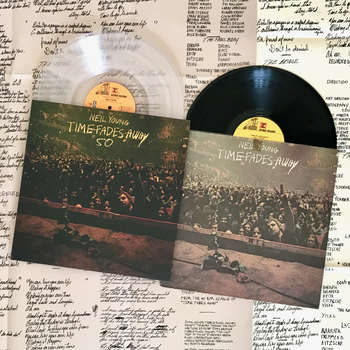TIME FADES AWAY
Author: Bruce Jenkins Date Posted:29 December 2023

After the unexpected success of the million selling Harvest, Neil Young decided to mount his biggest ever tour. It’s what you do, isn’t it? Tour to promote the new album. Always uncomfortable with mainstream success, Young opted for an unusual strategy for the concert set list and his first live album.
Here is Neil’s five point plan:
- Play a bunch of totally new songs to huge audiences coming to hear the pretty "Heart Of Gold".
- Tour intensely with a hard-edged band until misery and exhaustion fuck up your voice.
- Call buddies David Crosby and Graham Nash for support.
- Stagger through to the end then release the album. Call it Time Fades Away.
- Promote product with comments such as, "The worst record I ever made."
But Time Fades Away is not bad. Tuneful and tortured, it is, in fact, magnificent.
The LP opens with the title track "Time Fades Away". There’s a country stomp feel, some pedal steel and creaky harmonica over a repetitive piano figure. The lyric recalls growing up in Canada and you can hear the strain in Young’s voice as he pleads, Son, don’t be home too late. The line about junkies being too weak to work sends a chill up your spine when you know the story. Crazy Horse guitarist Danny Whitten died of an overdose shortly after being sacked from band rehearsals due to drug-induced incompetence. A few days later they were on the road, Young wracked with guilt and grief for his friend.
The melancholic reverie continues with "Journey Through The Past". Just Neil at the piano, going back to Canada, to innocence of a kind; yearning for connection, searching for comfort in a heartless world. Then, shaking himself off like a shaggy dog emerging from a cold pond, Young turns his anger outwards, taking a swaggering shot at religion in "Yonder Stands the Sinner". The side closes out with the simple, plaintive, "Love In Mind".
Side 2 begins with "Don’t be Denied", another directly autobiographical song that reports on Young’s experience of school-yard bullying, his parents’ marriage break-up and finding life in music. The simple melodic riff is hypnotic and somehow encouraging. The punches came, his voice is cracked but don’t be denied. Don’t be denied.
"The Bridge" has beauty and longing. It tells of loss and redemption and how broken things can be repaired. A genuinely touching song.
The original album finishes with "The Last Dance". Sprawling, reeling, angst-ridden, it is a tortured powerhouse of a song that still contains a thread of hope. Laid back and laughing sings Young; unconvinced yet wanting it to be true.
And then, an unusual move. After slagging off the album and denying it an official CD release until 2022—almost half a century after its release—Neil Young added a bonus track to the fiftieth anniversary vinyl re-issue. "The Last Trip To Tulsa" (lyrics scrawled on the oversize LP insert in the style of the other songs) is an odd, Dylanesque shuffle from Young’s self-titled 1968 album. The B-side of the "Time Fades Away" single, it’s good without adding much to an album consisting of otherwise new songs.
There is a famous comment in the liner notes of Harvest about the success of the single "Heart Of Gold." Young said the song “put me in the middle of the road. Traveling there soon became a bore, so I headed for the ditch. A rougher ride but I saw more interesting people there.” *
At around 40 minutes Time Fades Away is scarcely a marathon ride yet by the end of the record we are wrung out. And also somehow exhilarated. The artist is bruised, vulnerable. He suffers, we get art. We suffer, he shares pain. We are each alone but not alone; there is music, and each other.
Greetings from the ditch.
* Time Fades Away (1973) is the first of what is known as "The Ditch Trilogy". It was followed by Tonight’s The Night and On The Beach. All are bleak but brilliant.
Parts of this piece first appeared at Vinyl Connection, the author’s blog.
© Bruce Jenkins—December 2023

